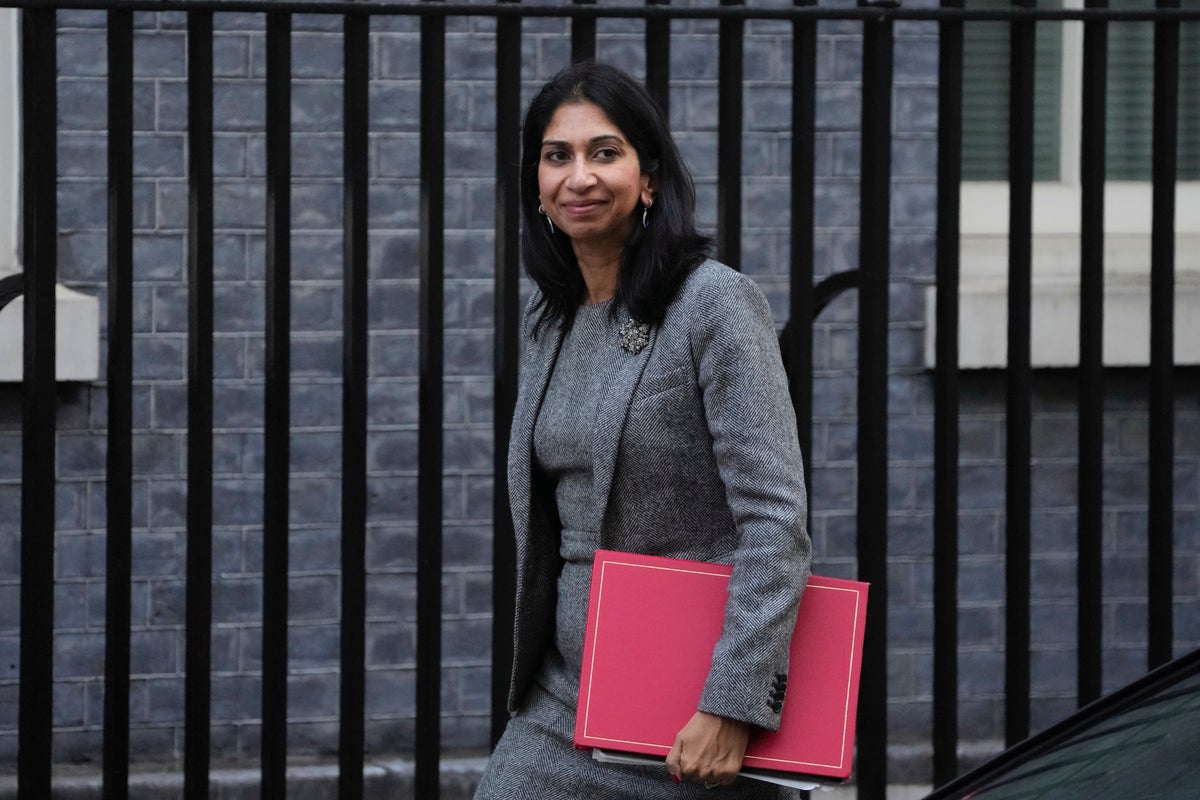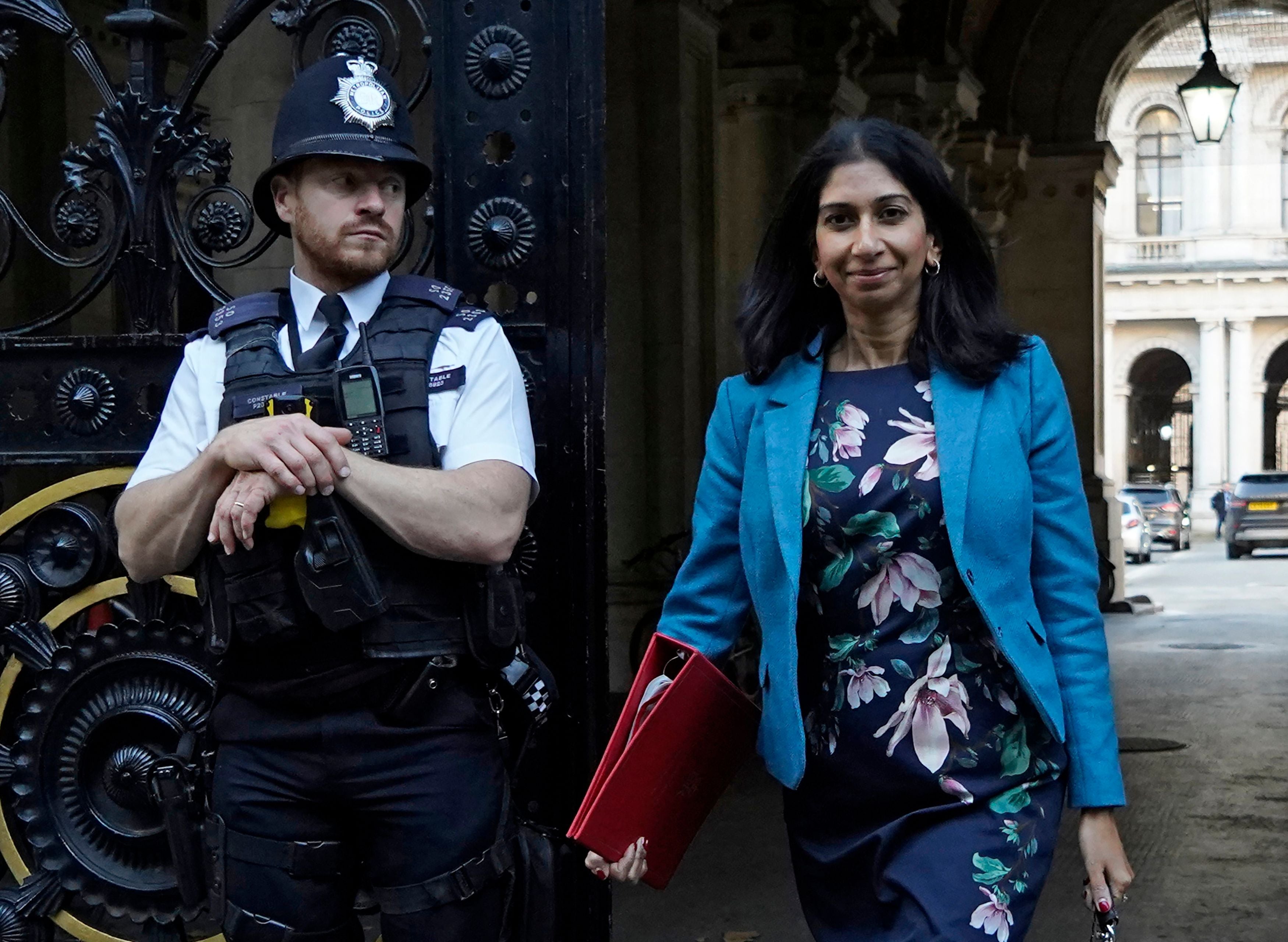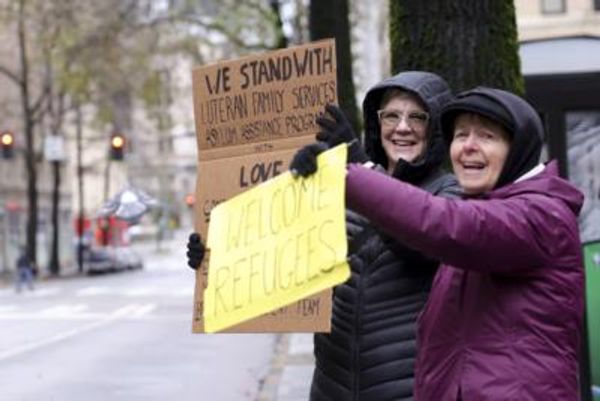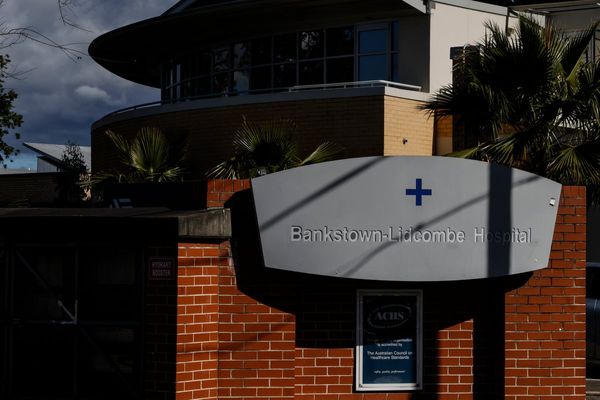
Suella Braverman has made a contentious return to Cabinet after she was re-appointed as home secretary by prime minister Rishi Sunak.
She returns to the top table just six days after being forced to resign over a serious security breach.
Labour criticised the appointment, with shadow home secretary Yvette Cooper accusing Mr Sunak of putting his own political interests over the country’s interests.
“He has just appointed Suella Braverman to be home secretary again a week after she resigned for breaches of the ministerial code, security lapses, sending sensitive government information through unauthorised personal channels, and following weeks of nonstop public disagreements with other cabinet ministers,” she said.
It was later revealed the Home Secretary sent official documents from her government email address to her personal account address six times but insisted there was “no risk to national security”.
Ms Braverman is a staunch Brexiteer and a figurehead of the Tory right who Mr Sunak will have wanted to get onside in his unity cabinet.
But what do we know about Ms Braverman, who lasted just 44 days as Liz Truss’s home secretary?
We look at her rise, fall and rise again.
From Cambridge to Conservative MP
Born Sue-Ellen Cassiana Fernandes in Harrow on 3 April 1980, her parents Christie and Uma Fernandes arrived in Britain in the 1960s from Kenya and Mauritius respectively but are of Indian origin. Her father worked for a housing association and her mother was a nurse turned councillor in Brent.
Ms Braverman was raised in Wembley, attended Heathfield School in Pinner and went on to read law at Queens’ College, Cambridge, where she also served as chair of the Cambridge University Conservative Association.

She then spent two years studying in France thanks to the opportunities presented by the Erasmus Programme – which the UK no longer participates in as a result of its withdrawal from the EU, a cause she continues to champion nonetheless – earning a master’s degree in European and French law at the Pantheon-Sorbonne University.
Ms Braverman was called to the bar at Middle Temple in 2005, specialising in commercial litigation, judicial review, immigration and planning law, while also contesting Leicester East in that year’s general election, losing out to Labour’s Keith Vaz.
She was again unsuccessful in Bexhill and Battle five years later, before finally winning a seat in Fareham, Hampshire, in 2015, which she has held ever since.
Becoming attorney-general
From 2015 to 2017, she served on a series of parliamentary select committees supporting education and financial literacy while campaigning for the Leave cause.
After the Brexit referendum, she became chair of the right-wing European Research Group within the Conservative Party, before her promotion to parliamentary private secretary to the Treasury saw her replaced by Jacob Rees-Mogg.
The January 2018 reshuffle saw her become parliamentary under-secretary of state for exiting the European Union, although she resigned the following November alongside Dominic Raab and other “Spartans” in protest at Theresa May’s draft Brexit deal.
That same year, she married Rael Braverman, an executive at Mercedes-Benz.

After another reshuffle in February 2020, she succeeded Geoffrey Cox as attorney general, serving until March 2021 before taking maternity leave and then resuming the role last September after Michael Lewis had stepped in.
She was criticised over her inexperience when she was first given the job and attracted further controversy over alleged political meddling, notably over the activists who tossed a statue of slave merchant Edward Colston into Bristol Harbour in June 2020 and over Mr Johnson’s plans to tear up the Northern Ireland Protocol.
When the European Court of Human Rights intervened in June to ground a planned deportation flight sending asylum seekers to Rwanda, Ms Braverman responded by saying that it was “time to complete Brexit and let the British people decide who can and cannot stay in our country”, stating her “significant reservations” about what she derisively called the ongoing influence of the “Strasbourg Court”.
Culture war clashes
Ms Braveman has drawn heat for her comments in interviews, notably a piece in The Times this summer in which she expressed her pride at being “a child of the British Empire”.
She maintained the empire had been a “force for good”, and called on schools not to “pander” to trans children, citing her admiration for Harry Potter author JK Rowling, whom she called a “heroine” for her stance on the issue.
“If I get trolled and I provoke a bad response on Twitter I know I’m doing the right thing,” she told the newspaper, anticipating the backlash her provocations were warmly inviting.
“Twitter is a sewer of left-wing bile. The extreme left pile on is often a consequence of sound conservative values.”
In July, she said the reason Brexit was backfiring economically was because some civil servants with a “Remain bias” were actively resisting implementing reforms as they could not imagine “life outside of the EU”, a conspiracy-minded remark with more than a hint of Trumpian “deep state” paranoia about it.

Tory leadership bid
Some 12 hours before Boris Johnson finally accepted the inevitable and announced that he was stepping down as prime minister in July, the first candidate to succeed him had already made herself known.
Then-attorney general Ms Braverman said she planned to stay in her post for the greater good of the country but denounced Mr Johnson for his mishandling of the Chris Pincher sexual harassment scandal that ultimately proved his undoing.
The PM had conducted himself “appallingly”, Ms Braverman said, adding: “The balance has tipped now in favour of saying that the prime minister – it pains me to say it – but it’s time to go.”
She then signalled her own intention to run for leadership, saying: “I love this country, my parents came here with absolutely nothing and it was Britain that gave them hope, security and opportunity.
“This country has afforded me incredible opportunities in education and in my career. I owe a debt of gratitude to this country and to serve as PM would be the greatest honour, so yes, I will try.”
Within hours of Mr Johnson’s ungracious resignation speech the following afternoon, she already had a Twitter account promoting her campaign up and running.
A host of other candidates quickly declared and Ms Braverman quickly found herself out of the running, but she certainly had her supporters on the right of the party, drawn to her passionate support for Brexit and willingness to swing an axe in the culture wars, readily denouncing “woke nonsense” at every opportunity.

Home secretary appointment
Ms Braverman was appointed home secretary by eventual winner Ms Truss in September, replacing the deeply unpopular Priti Patel.
Within days she told civil servants her top priority in the job was blocking cross-Channel illegal immigration.
With her hardline crackdown on climate protesters Ms Braverman continued to be a standard-carrier for the Conservative right.
During her short tenure Ms Braveman clashed with the prime minister over immigration, breaking with the government line by saying she wanted a return to David Cameron’s target of fewer than 100,000 newcomers a year.
And she raised hackles on Tuesday by blaming disruptive climate protests on “Guardian-reading tofu-eating wokerati”, prompting confusion and mockery from people pointing out that tofu hardly threatens peace on the streets.
Quits over ‘mistake’ email
After just six weeks in the home secretary’s job, she resigned.
Ms Braverman claimed she made a “mistake” in sending an official document from her personal email account.
But as she stood down, Ms Braverman could not resist having a dig at her former boss.
In a damning letter of resignation, she wrote: “The business of government relies upon people accepting responsibility for their mistakes.
“Pretending we haven’t made mistakes, carrying on as if can’t see that we have made them, and hoping that things will magically come right is not serious politics.
“Not only have we broken key pledges that were promised to our voters, but I have had serious concerns about this government’s commitment to honouring manifesto commitments, such as reducing overall migration numbers and stopping illegal migration, particularly the dangerous small boats crossings.”
Back as home secretary
Ms Braverman made a dramatic return as home secretary mere days after resigning from the role under Ms Truss’s government.
She was welcomed back by Mr Sunak in his first cabinet appointments as prime minister. Her appointment has prompted backlash from Labour and the Lib Dems, who argue that Mr Sunak has already trashed his pledge to restore “integrity” by reinstating Ms Braverman.
Foreign secretary James Cleverly has been forced to defend the appointment to the media, saying that Ms Braverman has a “very clear agenda” that the prime minister wants to see delivered.
Labour shadow education secretary Bridget Phillipson accused Mr Sunak of striking a “grubby deal” with Ms Braverman, amid rumours that Ms Braverman made getting her home secretary job back a condition of her endorsement of Mr Sunak in the leadership race.







